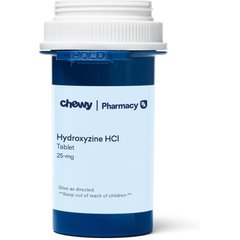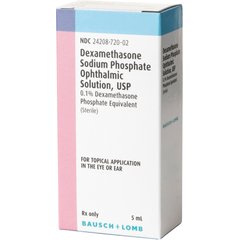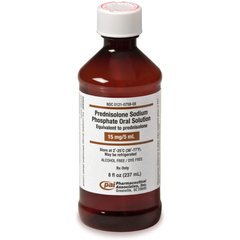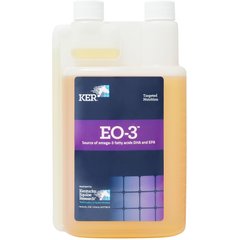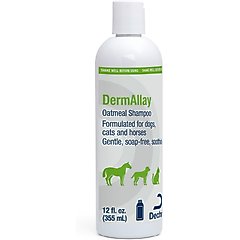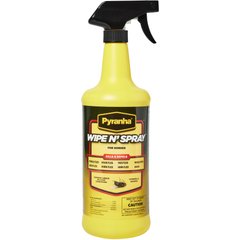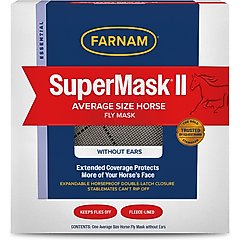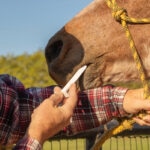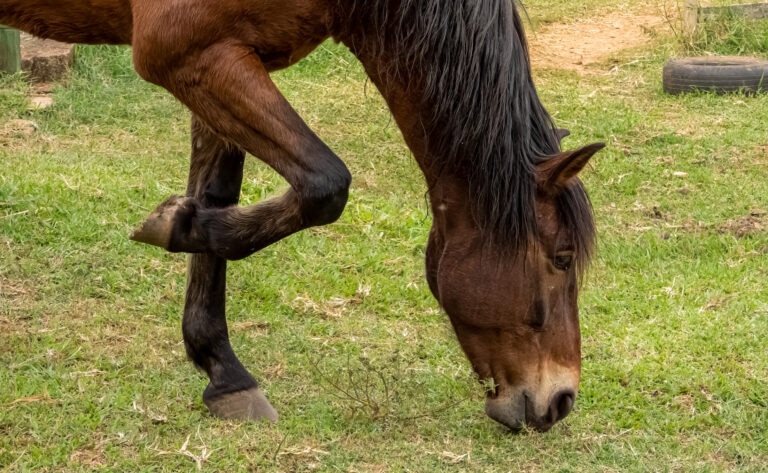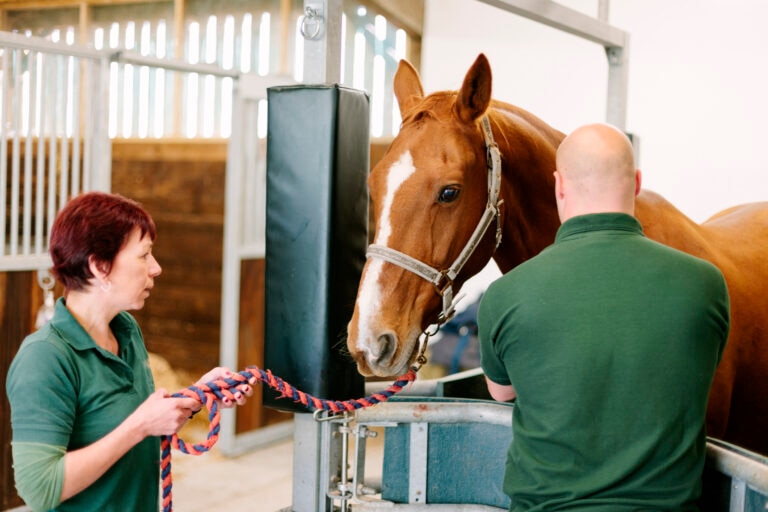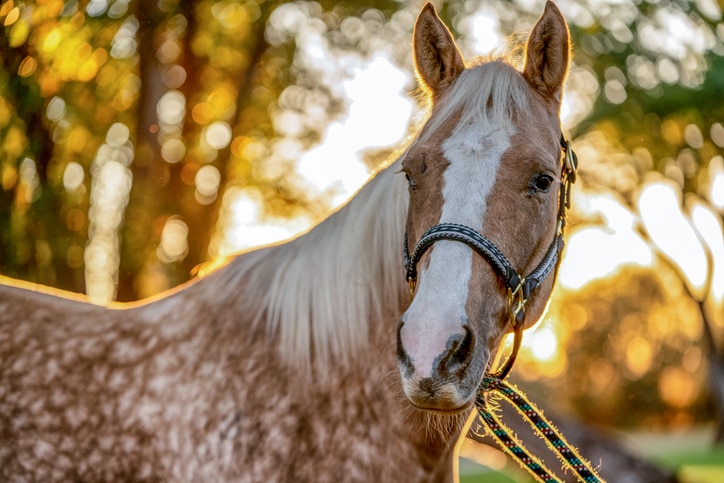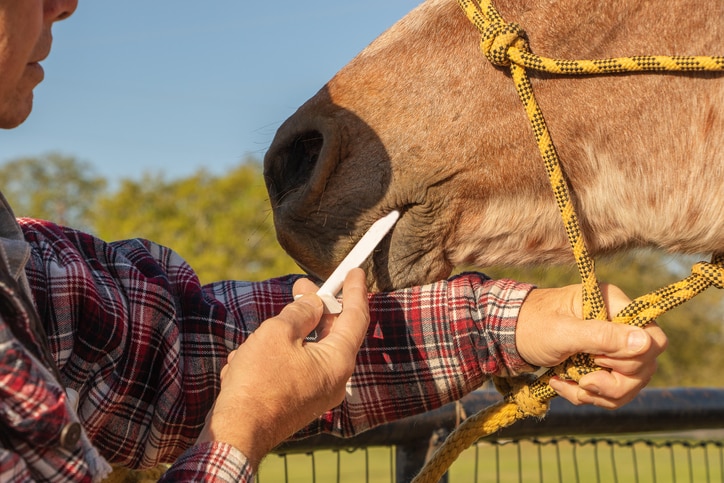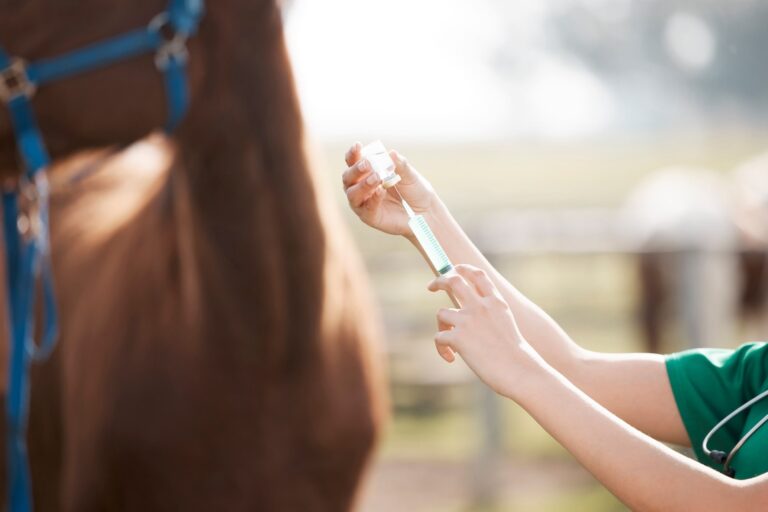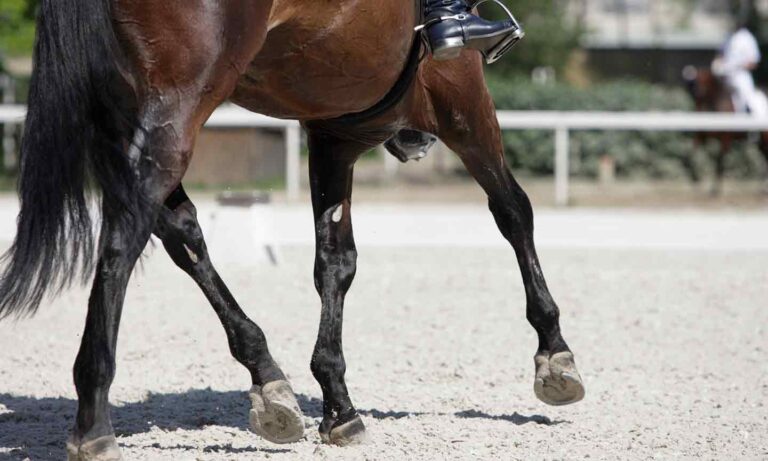Allergies in Horses: Symptoms and Treatment for Equine Allergies

Photo by Nemyrivskyi Viacheslav/Getty
Notice itching, hives or watery eyes in your horse? Like the rest of us, horses can suffer from allergies and experience an array of unpleasant reactions—and, not to mention, lots of discomfort if left untreated. Because equine allergies can be complex, coming up with a solution can require you to work like a horse!
We’re here to help. We spoke with a veterinary expert about allergy causes, symptoms, treatment and prevention to help keep your horse happy and healthy for many years to come.
Symptoms of Allergies in Horses
Dr. Chelsea Fishenfeld, aka “Dr. Fish,” DVM, veterinarian at Loomis Basin Equine Medical Group and Equine Medical Associates in Lake Forest, California, says the first step in being able to help your steed is knowing what to look for.
Common equine allergy symptoms can include:
- Hives (urticaria)
- Heaves (shortness of breath, increased respiratory effort, chronic cough, exercise intolerance)
- Nasal discharge with a milky consistency
- Swollen eyelid(s)
- Conjunctivitis (eye inflammation)
- Watery eyes
- Swollen sheath
- Swelling under the abdomen
- Itching (pruritus), leading to scratching on stall or other objects
- Hair loss
- Dermatitis (skin inflammation)
While these signs usually indicate an allergy, Dr. Fish says that sometimes they are linked to other conditions:
- Swelling: Some horses on pasture can develop an increased inflammatory response in their parotid gland, known as grass glands or “parotiditis,” which is sometimes mistaken for a swollen face or allergic reaction, Dr. Fish says. The two conditions are treated similarly.
- Increased respiration: Increased respiration can be a sign of pain in horses. A vet can identify this sign through a physical exam and then treat the horse accordingly.
- Nasal discharge: Infectious agents, tooth root abscesses and foreign bodies can cause a runny nose or nasal discharge. This can be mistaken for allergies and requires further diagnostics and stall-side testing.
- Eye issues: Excessive tearing and rubbing can be indicative of eye issues such as uveitis (eye inflammation). An ophthalmic exam can identify the condition.
- Rubbing of the tail: This behavior can sometimes be due to a pinworm infestation. Dr. Fish recommends that horses be on a regular deworming and parasite control program.
- Swollen sheath: The sheath refers to the covering of skin and tissue that surrounds the penis in male horses. A swollen sheath can occur for various reasons. To determine the underlying cause, a blood panel must be performed, as well as an assessment of organ function and electrolytes, particularly in older horses.
Consult your veterinarian to pinpoint the cause of your horse’s symptoms.
Less common signs of allergies in horses include:
- Chronic colic (accompanied by weight loss)
- Chronic loose manure (diarrhea)
- Lacerations due to excessive scratching in response to itching
- Corneal ulcers due to scratching or rubbing of the eyes in response to itching
- Absolute eosinophilia (high white blood cell count) on routine lab work in context of other history or physical exam findings
With severe allergic reactions, there’s a rare risk of anaphylaxis, which can be life-threatening and requires immediate vet care.
Dr. Fish says it’s imperative to have your vet evaluate your horse or provide further guidance in deciding necessary treatment.
Common Causes of Allergies in Horses
So, why do allergies in horses happen? Essentially, for the same reasons they do in people and other animals—a hypersensitivity to a stimulus in their environment, feed or air, Dr. Fish says.
“An inflammatory cascade is triggered by the horse’s immune system, which results in multiple mechanisms creating the unwanted conditions that horses experience and that we observe,” she explains. One of the most common calls she gets while on emergency duty is about hives, both recurring and first-time flare-ups.
Allergies to Insect Bites
One of the most common allergies in horses is to insect bites. Dr. Fish notes that a very common allergy in horses is to Culicoides, also known as “biting midges.” The horse’s hypersensitivity to these bloodsucking insects is often extremely irritating, as their saliva causes a reaction wherever they bite, which is usually the mane and underbelly region.
Horses can also develop seasonal allergies. According to Dr. Fish, this type of allergy is generally related to insects during specific times of the year, like spring.
Environmental Allergies
Depending on where a horse is housed, the environment may contain a multitude of potential allergens that are hard to avoid, especially in barns and box stalls, Dr. Fish says.
Examples of common airborne allergens include:
- Dust or dust mites
- Different types of trees
- Pollen
- Mold
- Mildew
Food Allergies
Food allergies in horses are considered to be rare but can occur. Certain types of hay and grains, as well as high-protein food concentrates, can cause allergic reactions in horses. Dr. Fish says this varies from horse to horse.
Treatment for Allergies in Horses
“Many times in field practice, we treat the clinical signs the horse has with the described modalities,” Dr. Fish says. “On examination, allergies can be diagnosed preliminarily.”
While symptoms can be treated, it’s important to find out what’s causing the allergic reaction to prevent future occurrences.
One task Dr. Fish recommends: Keeping a log of when the reaction happens and if anything changed that day for the horse—whether it’s fly spray, new hay batches or shavings, different tack or soap, an increase or change of location of exercise, etc.
“There could be a very small change making a very big reaction in that horse,” she says. “Identifying the stimulus is half the battle in this, which is why diagnostics are the next piece of the puzzle.”
To identify the specific allergens and hypersensitivity in a horse, vets and veterinary dermatologists generally use the following methods:
- Allergy testing, in which blood is pulled from the horse and the serum is sent to an outside laboratory service to identify allergies
- Skin testing, in which an antigen is placed under the skin and shows which areas are reactive, ultimately indicating what the horse is allergic to
- Bronchoalveolar lavage (BAL), in which a bronchoscope is passed through the nose or mouth into the lungs to collect fluid for testing
“The most important thing to understand about treating allergies is that you are either treating the symptoms or identifying the stimulus and avoiding it,” Dr. Fish says.
She adds that managing expectations about “treating” or “curing” allergies is also crucial to the pet parent caring for the horse, as there isn’t a set umbrella treatment or cure for horse allergies. However, immunotherapy injections can modify a horse’s immune response to the stimulus, and medications can target the mechanisms that create issues.
Medications
Antihistamines are the most common over-the-counter medications equine vets give to horses. They’re safer to administer and can help stop one of the mechanisms triggered in the horse by whatever they’re allergic to, Dr. Fish says. Over-the-counter antihistamines that are designed to control symptoms include diphenhydramine (Benadryl) and cetirizine (Zyrtec). But hold your horses (figuratively speaking) before giving this to them yourself—Dr. Fish says over-the-counter antihistamines should still be used under the supervision of a vet.
A vet may prescribe or administer the following:
- Hydroxyzine (antihistamine)
- Injectable anti-inflammatories, antihistamines or potentially steroids
- Topical shampoos containing steroids (for skin contact hypersensitivity reactions)
- A steroid ophthalmic ointment (for chronic allergy-related conjunctivitis)
- Inhalants, such as steroids and bronchodilators (for equine asthma)
- Immunotherapy or allergy shots
Corticosteroids, such as dexamethasone and prednisolone, are also designed to mitigate acute allergic responses in horses. However, they do have risks, such as potentially causing laminitis in horses with insulin resistance or pituitary pars intermedia dysfunction (PPID) and decreasing immune response to fight infections. Dr. Fish emphasizes that the use of steroids should always be carefully monitored under the supervision of a licensed vet.
Recommended Products
Supplements
Products containing omega-3 fatty acids have generalized anti-inflammatory properties and may assist in reducing inflammation associated with an allergic response in the skin, airway or gastrointestinal tract, Dr. Fish says.
She notes that supplements, such as fish oil, can have good outcomes in helping with skin allergies, as long as they’re used in conjunction with traditional therapies.
Recommended Products
Other Management Tips
Whether you know exactly what your horse is allergic to or not, try the following tips from Dr. Fish to keep them comfortable:
- Use coconut oil or olive oil for a dry and itchy tail.
- Use a steroid shampoo prescribed by your vet or an oatmeal shampoo.
- Avoid sharp objects and maintain stalls or barns to prevent injury.
- Get to the bottom of the allergy or the cause of itching to rule out parasites.
Recommended Product
Equine Allergy Prevention
Much like with people, allergies in horses can be extremely difficult to control and predict—even with lifelong veterinary care, Dr. Fish says.
“The most successful way to control the negative effects of allergies is to remove what the horse is allergic to, which is sometimes impossible logistically,” she adds.
To prevent allergies in your horse, try these tips:
- Use insect repellents, such as fly sprays (note that horses can also be sensitive or allergic to these), fly masks or fly sheets.
- Opt for a water-based fly spray instead of an oil-based one for horses with sensitive skin or those allergic to fly spray.
- Use fans to deter and decrease the presence of insects.
- Wet down or steam hay and feed off the ground to prevent dust accumulation.
- Water down arenas and other sources of dust.
Recommended Products
“Keeping any horse on a well-balanced diet with appropriate trace minerals, regular exercise, routine veterinary care and regular chiropractic care can help keep the horse’s immune system functioning well to handle environmental stimuli as best as possible,” Dr. Fish says.
Ultimately, the most effective way to prevent your horse from experiencing allergies is to address the exposure to the allergen or treat symptoms when they arise.
The bottom line: With the help of your equine vet, you can determine the best care and management for your horse’s allergies. If your horse shows any unusual signs, it’s always a good idea to consult a professional to find out the cause and treat the issue appropriately.
Expert input provided by Dr. Chelsea Fishenfeld, DVM, veterinarian at Loomis Basin Equine Medical Group and Equine Medical Associates in Lake Forest, California.
This content was medically reviewed by Chewy vets.
